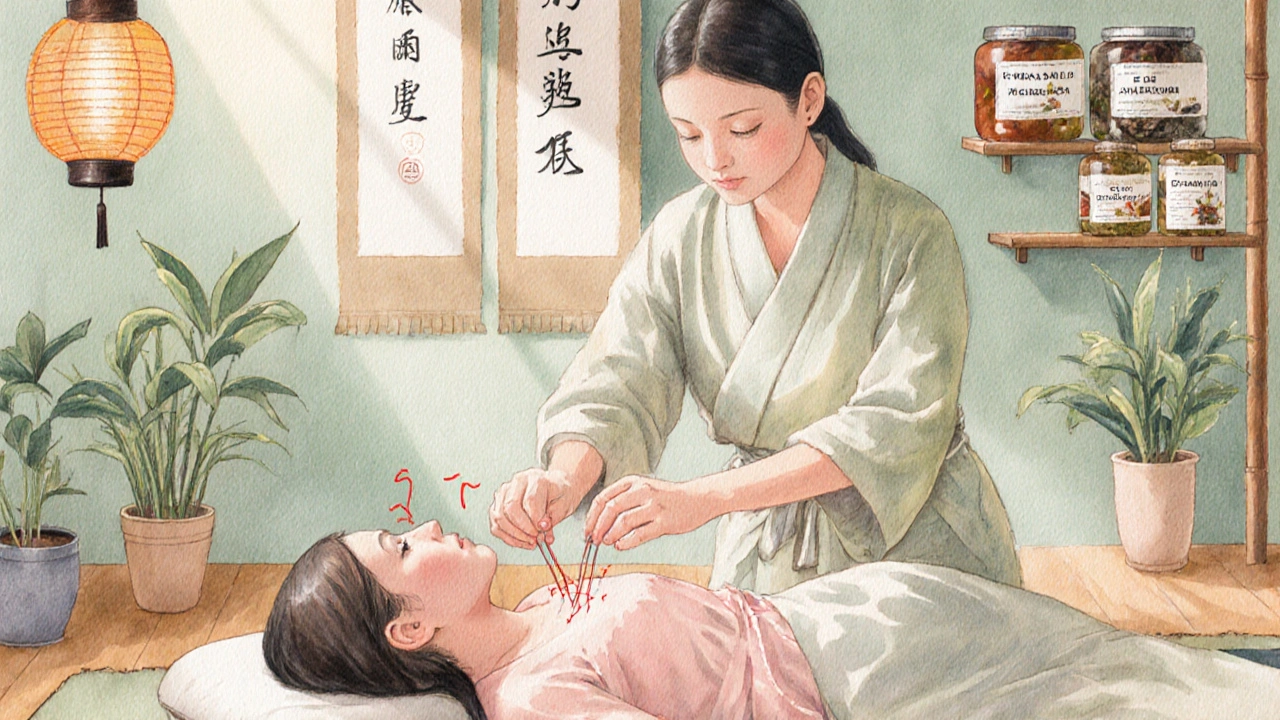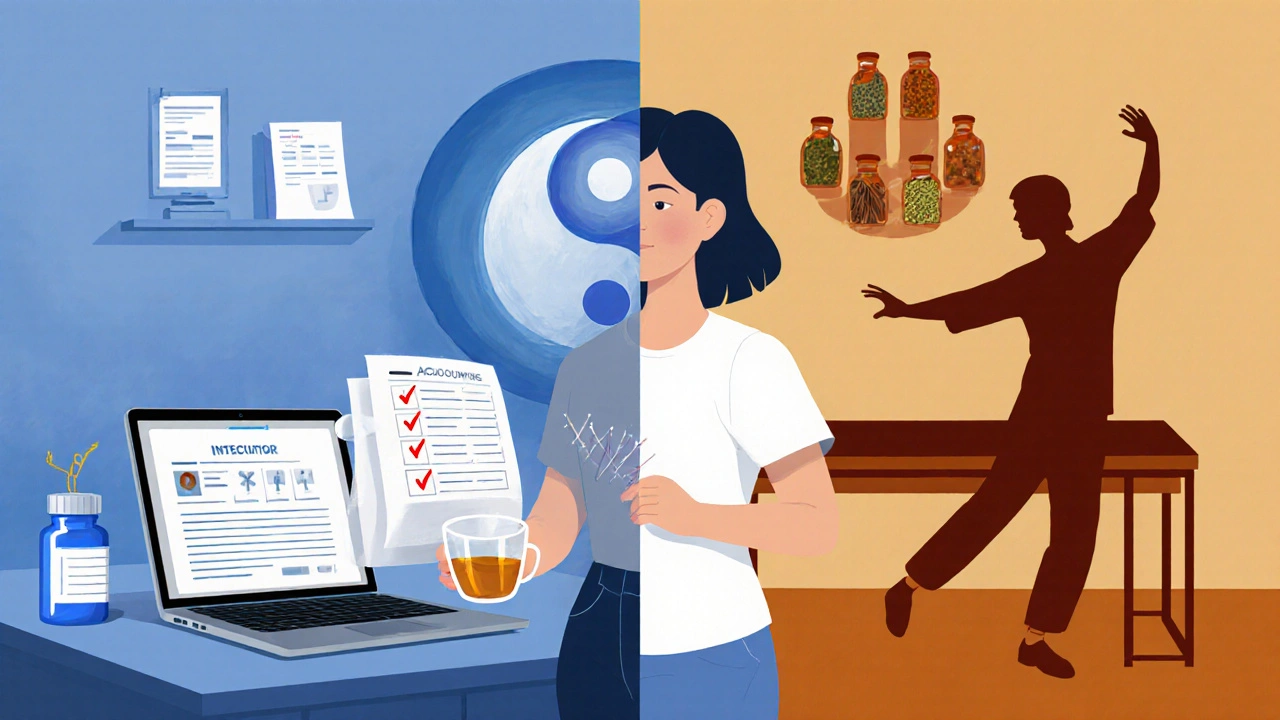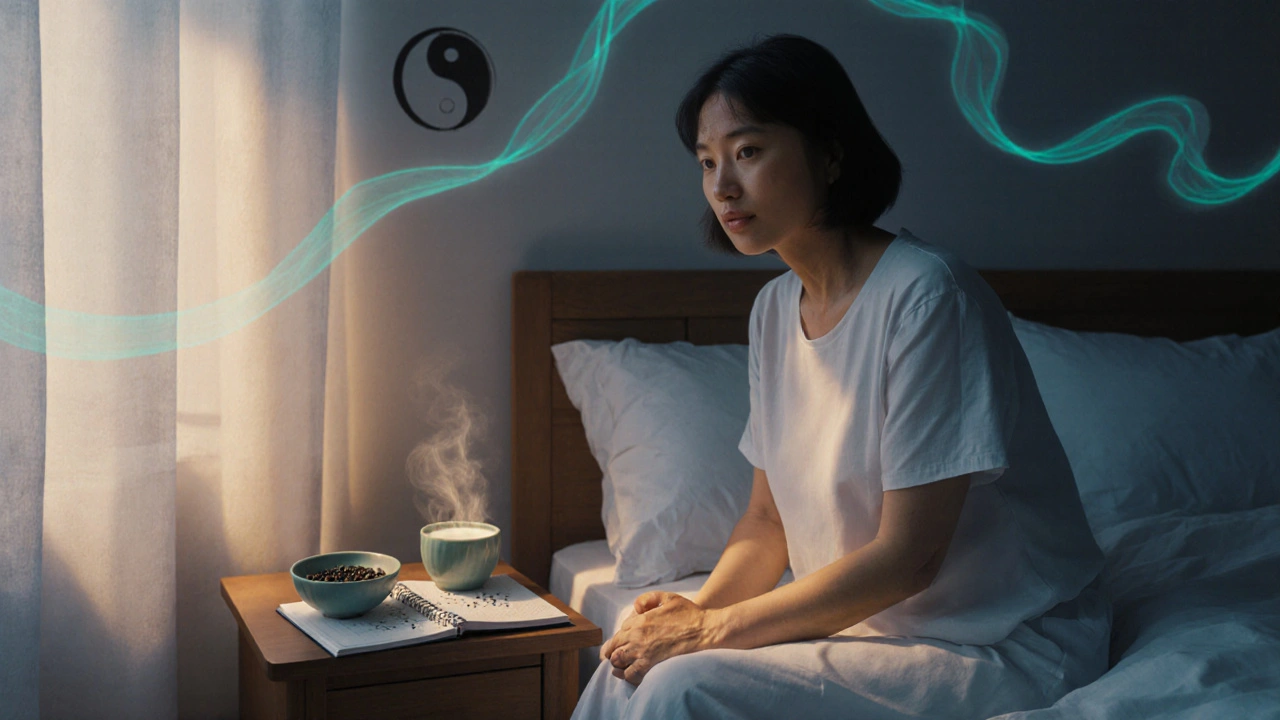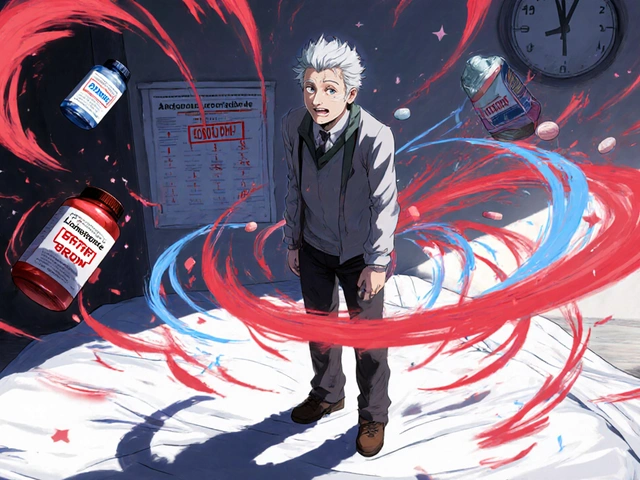Menopause Symptom Tracker & TCM Guidance
Track Your Symptoms
Record your menopause symptoms daily to identify patterns and track progress with TCM approaches.
Your Symptom Profile
Hot Flashes
Night Sweats
Overall Balance
TCM Guidance for You
When the symptoms of menopause start to disrupt sleep, mood, and daily comfort, many women look for options beyond the standard hormone pills. Traditional Chinese Medicine a holistic system that balances the body’s vital energy (Qi), Yin, and Yang through herbs, needle work, diet, and movement offers a centuries‑old toolbox aimed at easing those hot flashes, night sweats, and mood swings without synthetic hormones.
Key Takeaways
- TCM views menopause as a shift in Kidney and Liver balance, not just a drop in estrogen.
- Acupuncture, specific Chinese herbs, and dietary tweaks can reduce hot flashes by 30‑60% in clinical trials.
- Safety hinges on working with a qualified practitioner and disclosing any conventional meds.
- Integrating TCM with standard care creates a personalized, low‑risk plan.
- A simple checklist helps you start the dialogue with a TCM specialist.
How TCM Understands Menopause
In Menopause the natural transition marking the end of menstrual cycles, typically between ages 45‑55, TCM does not focus on estrogen alone. The decline in reproductive hormones is seen as a weakening of the Kidney’s Yin and a rise in internal heat. Two core concepts explain the experience:
- Qi the circulating life force that powers every organ becomes erratic, leading to night sweats and fatigue.
- The imbalance between Yin cooling, nourishing aspects of the body and Yang warming, activating aspects of the body creates the “heat” sensations known as hot flashes.
When Kidney Yin wanes, the Liver may over‑compensate, resulting in emotional volatility and mood swings. Restoring harmony means nourishing Yin, calming excess Yang, and smoothing the flow of Qi.
Core TCM Modalities for Menopause Relief
Acupuncture
Insertion of ultra‑fine needles at specific points-most commonly LI4, SP6, HT7, and KI3-has been shown to modulate the autonomic nervous system, lowering the frequency of hot flashes. A 2023 meta‑analysis of 12 randomized trials found a 45% reduction in hot flash intensity for women receiving regular acupuncture compared with sham controls.
Chinese Herbal Formulas
Herbs are blended into formulas that target the underlying Kidney and Liver patterns. The most frequently cited recipes include:
- Zhi Bai Di Huang Wan a Yin‑nourishing mix of Rehmannia, Anemarrhena, and Phellodendron that cools internal heat
- Liu Wei Di Huang Wan adds Cornus and Dioscorea to strengthen Kidney essence and improve bone health
- Xiao Yao San soothes Liver qi stagnation, helping with mood swings and irritability
These formulas are usually taken as decoctions or standardized granules for 3‑6 months, with periodic adjustments based on symptom tracking.
Dietary Therapy
TCM dietary advice focuses on foods that replenish Yin and support Kidney function. Include:
- Black sesame seeds and walnuts (rich in calcium and omega‑3s for bone density).
- Tofu, soy milk, and black beans (plant‑based proteins that stabilize blood sugar).
- Fresh pears, apples, and watermelon (cooling fruits to counteract internal heat).
- Cooked greens like spinach and bok choy (source of magnesium for muscle relaxation).
A diary of food intake and symptom changes often reveals which items provide the most relief.
Movement & Breath: Qi Gong & Tai Chi
Gentle, rhythmic movements help circulate Qi and calm the nervous system. A 2022 pilot study showed participants who practiced 30 minutes of Tai Chi three times a week reported a 35% drop in night sweats after eight weeks.

Evidence Snapshot
Beyond the acupuncture meta‑analysis, other research backs TCM’s role:
- A 2024 Chinese‑American study of 210 menopausal women found that Zhi Bai Di Huang Wan lowered serum FSH levels and improved sleep quality (PSQI score reduced from 12 to 7).
- Bone‑density scans on women using Liu Wei Di Huang Wan for one year showed a 2.4% increase in lumbar spine BMD, comparable to low‑dose calcium‑vitamin D supplementation.
- Patient‑reported outcomes consistently highlight reductions in anxiety and improved vaginal dryness when herbs are combined with lifestyle changes.
While larger, multi‑center trials are still needed, the current data suggest TCM can safely complement conventional approaches.
Safety, Contraindications, and Choosing a Practitioner
Herbs are powerful; they can interact with blood thinners, antihypertensives, and especially with hormone‑based therapies. Always disclose any prescription meds to your TCM practitioner.
Look for credentials such as a Certified Acupuncturist (CAX) or a Master’s degree in Traditional Chinese Medicine from an accredited school. Ask about:
- Experience treating menopausal patients.
- Standardized herbal sourcing (Good Manufacturing Practice).
- Follow‑up schedule-ideally every 4‑6 weeks to adjust formulas.
Women who are pregnant, have severe liver disease, or are on anticoagulants should avoid certain herbs like Danshen or excessive licorice.
Integrating TCM with Conventional Care
Most women don’t have to choose one path over the other. Here’s a step‑by‑step checklist to blend the two safely:
- Document your primary symptoms (hot flashes, night sweats, mood, bone aches).
- Schedule a visit with a qualified TCM practitioner and share your medical history.
- Ask the practitioner to draft a personalized plan (acupuncture schedule + herb formula).
- Bring the herb list to your primary care doctor for a quick drug‑interaction review.
- Begin the TCM protocol while maintaining any prescribed medications, noting changes daily.
- Re‑evaluate after 8‑12 weeks; adjust herbs or acupuncture frequency as needed.
Keeping a simple spreadsheet with columns for “Date,” “Therapy,” “Symptom Rating,” and “Side Effects” turns subjective experience into actionable data.

Quick Comparison: TCM vs Hormone Replacement Therapy (HRT)
| Aspect | Traditional Chinese Medicine | Hormone Replacement Therapy |
|---|---|---|
| Primary Goal | Balance Qi, Yin, and Yang; nourish Kidney | Replace declining estrogen and progesterone |
| Typical Duration | 3‑12 months, then maintenance | Often 5‑10 years, can be lifelong |
| Common Side Effects | Minor bruising from needles, mild digestive upset from herbs | Increased risk of blood clots, breast tenderness, stroke |
| Effect on Bone Density | Positive (herbs like LiuWeiDiHuangWan support calcium metabolism) | Positive but requires calcium/vitaminD supplementation |
| Evidence Base | Growing pool of RCTs, strong historical use | Extensive large‑scale trials, FDA‑approved |
| Cost (U.S.) | $80‑$150 per acupuncture session; $30‑$70 per herb bottle | $0‑$200 per month depending on formulation |
When to Try TCM First
If you:
- Prefer a natural, non‑hormonal route.
- Experience mild‑to‑moderate hot flashes (<10 per day).
- Have a history of blood‑clotting issues that make HRT risky.
TCM can be a solid first line. If symptoms stay severe (>10‑15 hot flashes daily) despite 12 weeks of consistent treatment, discuss adjunctive HRT with your doctor.
Frequently Asked Questions
Can acupuncture reduce night sweats?
Yes. Multiple studies show that weekly acupuncture for 6‑8 weeks can cut night‑sweat episodes by about 40% on average. The effect is tied to improved autonomic regulation and reduced internal heat.
Are Chinese herbs safe if I’m already on a low‑dose estrogen patch?
Safety depends on the specific formula. Most menopause‑focused herbs are estrogen‑modulating rather than estrogen‑supplementing, so they usually don’t double‑dose. Still, you should get a doctor’s clearance, especially if the herbs contain phytoestrogens like soy isoflavones.
How long does it take to feel a difference?
Most women notice a modest improvement after 2‑3 weeks of regular acupuncture, while herbal formulas often need 4‑6 weeks to build up in the system. Patience and consistent tracking are key.
Do I need a prescription for TCM herbs?
In the U.S., reputable TCM clinics dispense herbs under a practitioner’s supervision, not a traditional pharmacy prescription. Look for products that follow Good Manufacturing Practice and have third‑party testing.
Can I combine TCM with lifestyle changes like yoga?
Absolutely. Yoga, mindfulness, and a TCM‑aligned diet all reinforce the same goal of balancing Yin and Yang. Just avoid overly vigorous workouts that generate excess Yang if you’re already heat‑sensitive.






Andy Williams
October 14, 2025 AT 12:33Just to clarify, the term “menopause” refers to the physiological cessation of ovarian function, not a disease state. In academic writing you’d avoid phrases like “the symptoms of menopause start to disrupt” and instead say “menopausal symptoms may disrupt”. Also, “traditional Chinese medicine” should be capitalized as a proper noun.
Paige Crippen
October 23, 2025 AT 10:26Don’t be fooled, the whole TCM push is a covert strategy by big pharma to keep us dependent on expensive supplements while they sell the “natural” label as a marketing ploy.
sweta siddu
November 1, 2025 AT 07:19Wow, this is such an eye‑opener! 🌸 I’ve been trying Xiao Yao San for mood swings and the difference is incredible. Pair it with some daily Tai Chi sessions and the hot flashes practically disappear. Keep sharing these tips, it really helps! 😊
Ted Mann
November 10, 2025 AT 05:13Balance, as you noted, is the crux of any therapeutic approach. When you view the menopausal transition through the lens of Yin‑Yang, acupuncture simply becomes a conduit for restoring equilibrium rather than a mere symptom blocker.
Brennan Loveless
November 19, 2025 AT 03:06Honestly, American women don’t need to borrow ancient Chinese tricks when we have modern science at our doorstep.
Vani Prasanth
November 28, 2025 AT 00:59I totally understand how overwhelming these changes can feel. Remember, small daily steps-like adding a handful of black sesame seeds to your breakfast-can accumulate into big improvements over time. You’ve got this, keep tracking and stay patient.
Jay Ram
December 6, 2025 AT 22:53Stay motivated, ladies! Consistency with acupuncture and herbs beats occasional effort any day.
Elizabeth Nicole
December 15, 2025 AT 20:46One practical tip: keep a simple spreadsheet with columns for “date”, “therapy”, “hot flash rating”, and “sleep hours”. This visual log makes patterns pop instantly and helps you and your practitioner fine‑tune the formula. Also, try drinking warm soy milk before bed; the phytoestrogens give a gentle calming effect. Don’t forget to hydrate-water aids the body’s natural detox pathways, which can reduce night sweats. Lastly, a short meditation before sleep can lower cortisol and improve overall rest.
Crystal McLellan
December 24, 2025 AT 18:39theyre hiding the real sideeffects of those herbs.
Mary Ellen Grace
January 2, 2026 AT 16:33Just wanted to say your post is super helpful! I made a tiny mistake in my diary-wrote “night sweats” twice-but still got great insight.
Carl Watts
January 11, 2026 AT 14:26The philosophical framing you propose aligns well with contemporary biopsychosocial models. By treating hot flashes as a manifestation of dysregulated autonomic tone, we can justify both needling and lifestyle interventions. Moreover, acknowledging the symbolic aspect of “heat” empowers patients to engage in cooling dietary strategies. This integrative perspective also mitigates the reductionist view that hormones alone drive the experience.
Brandon Leach
January 20, 2026 AT 12:19Sure, because we all love paying $150 per needle session. 🙄
Alison Poteracke
January 29, 2026 AT 10:13Great summary! For anyone new, start with a simple tea of chrysanthemum and goji berries-they’re gentle and support Yin. Remember to check the herb source for quality.
Marianne Wilson
February 7, 2026 AT 08:06While the article is thorough, it glosses over the fact that “natural” does not equal “risk‑free”. A more precise disclaimer about potential herb‑drug interactions would improve the piece.
Garrett Gonzales
February 16, 2026 AT 05:59From a clinical perspective, the integration of Traditional Chinese Medicine into menopausal care follows a multi‑tiered protocol. First, a comprehensive diagnostic questionnaire identifies the dominant pattern-whether it is Kidney Yin deficiency, Liver Qi stagnation, or a mixed syndrome. Second, individualized acupuncture point selection, typically including KI3, SP6, and HT7, targets both neuroendocrine modulation and local microcirculation. Third, the herbal prescription is calibrated; Zhi Bai Di Huang Wan addresses Yin deficiency with cooling agents, whereas Liu Wei Di Huang Wan emphasizes tonification of the Kidney essence. Fourth, dietary recommendations emphasize foods with a cooling property, such as watermelon, cucumber, and mung beans, to counteract internal heat. Fifth, adjunctive movement practices-Tai Chi and Qi Gong-are prescribed for at least 30 minutes three times weekly to promote Qi flow. Sixth, physiological monitoring includes serum FSH, estradiol, and bone density scans at baseline and after six months. Seventh, safety surveillance mandates liver function tests and coagulation profiles when herbs with known hepatotoxic or anticoagulant properties are used. Eighth, patient‑reported outcome measures, such as the Menopause Rating Scale, are recorded to quantify symptom relief. Ninth, practitioner‑patient communication is formalized through a shared decision‑making model, ensuring that any concurrent hormone therapy is adjusted based on TCM findings. Tenth, insurance considerations are addressed by documenting each modality with CPT codes for acupuncture and RHC codes for herbal consultations. Eleventh, longitudinal follow‑up occurs at four‑week intervals for the first three months, then quarterly, to fine‑tune the regimen. Twelfth, research feedback loops are established by contributing de‑identified data to registries, facilitating larger meta‑analyses. Thirteenth, interdisciplinary collaboration with gynecologists ensures that any emergent contraindications are promptly managed. Fourteenth, education modules for patients demystify concepts such as “Yin” and “Yang”, fostering adherence. Finally, outcome evaluation after a twelve‑month period determines whether the patient can transition to a maintenance phase or requires escalation to conventional hormone replacement therapy.
Aman Deep
February 25, 2026 AT 03:53Wow, that was a masterclass in TCM integration! 🌿 I love the colorful way you mapped each step-especially the “cooling” food parade. Remember, the “Yin‑Boosting Soup” with black beans and goji is a tasty shortcut for busy days. Also, a splash of creativity-drawing your own acupuncture chart can make the process feel personal. Keep those vibrant insights coming!